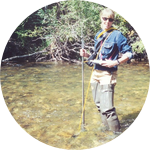About This Project
The Hawaiian bobtail squid is a model organism for researching human-microbe interactions. Despite efforts to keep artificial marine environmental conditions stable, squid sporadically become sick and die. Microbes have a direct influence on nutrient cycling and overall carbon balance within water systems. We hypothesize that bacterial microbiome changes in aquaculture can compromise the health of the squid and prevent critical research from being completed.
Ask the Scientists
Join The DiscussionWhat is the context of this research?
Hawaiian bobtail squid (Euprymna scolopes) is a model organism for studying host-microbe interactions. E. scolopes has a unique interaction with one species of luminescent bacteria (Vibrio fischeri), which aids the squid with counter illumination to avoid detection by predators at night. How the squid selectively allows only one species of bacteria into its light organ is poorly understood. A healthy tank system can support a population of adult squid for 3-4 months with 20% animal death only due to old age or natural causes. However, sudden changes in water chemistry/biochemistry can kill 100% of the squid population within a few days. Our research investigates the dynamics of microbial community structure that contribute to the health or decline of squid populations.
What is the significance of this project?
Euprymna scolopes as an important model organism for the study of ethological descriptions of burying and escape responses, histological studies of the epithelium, ultrastructural studies of the nuchal organs, molecular genetics of symbiosis, bacterial colonization of host epithelia, and organismal/microbial evolution (3). Therefore maintaining productive cohorts for research allows continuing critical insight into the associations between humans and their microbiota that cause aberrant and chronic inflammation and disease. Aquaculture of squid husbandry gives us a greater understanding of environmental microbiomes, and may help identify previously unknown squid pathogens or parasites.
What are the goals of the project?
Our goal is to extract total DNA from water and sediment samples collected during the years of 2017 (unproductive), 2018 (productive), and 2019 (productive) of different cohorts of Hawaiian bobtail squid with their respective controls from aquaculture tanks. The extracted DNA will be prepared and sent for next generation sequencing targeting the V4 region of the 16S rRNA gene in bacteria. Sequencing of this gene will allow us to identify and phylogenetically catalogue all microbes found in the aquaculture tanks. The resulting data will be analyzed for microbial architecture, presence of known pathogens, and identification of sustainable/healthy microbial communities across three years of squid aquaculture.
Budget
We are seeking $4400 to support undergraduate summer research experience (6-1-2019 to 9-1-2019) for researchers Erin Levon and John Phoenix. Southern Illinois University is one of the few universities that funds laboratory research experience to undergraduates during the Fall and Spring, but does not support their research during the summer. This support will enable Levon and Phoenix to conduct research over the summer. They intend to extract total DNA from sediment and water samples, submit the DNA for next generation sequencing, and develop programing skills to process the data. Funds will also help pay for next generation sequencing of the extracted DNA. The results from this study will enable Murphy, Levon, and Phoenix to present their data at scientific conferences and submit a manuscript for a peer-reviewed publication.
Endorsed by
 Project Timeline
Project Timeline
Dr. Hamilton-Brehm and Trevor Murphy will mentor and train Erin Levon and John Phoenix how to extract total DNA from forty samples taken from squid aquaculture habitats. Extracted DNA will be prepared for next generation sequencing at Argonne National Laboratory. All three students will work together to analyze the data, identifying changes in the microbiome, flagging known pathogenic microbes, and assessing the robustness of the results to derive an understanding of what makes the squid sick.
May 02, 2019
Project Launched
Jun 03, 2019
Begin extraction of total DNA from all samples
Jun 28, 2019
Complete extraction of total DNA from squid aquaculture samples
Jul 01, 2019
Prepare samples for Next generation sequencing
Jul 22, 2019
Next generation sequencing data is received
Meet the Team
Affiliates
Scott Hamilton-Brehm
My research laboratory focuses on microbial diversity in aquatic oligotrophic, geothermal, and ancient environments. Microorganisms from these environments possess characteristics valuable to applied research. The underlying fundamental principles are analyzed using biochemistry and bioinformatics, where we examine extant/extinct microbial biomes, characterize novel pathways to produce value added molecules/biofuels, determine critical species involved in remediation/recovery processes, and piecing together the mechanisms that support the origins of life.
While my research interests cover many areas of microbial biochemistry, the three research themes pursued currently are to: 1) isolate/characterize deep subsurface microorganisms to determine how life is sustained in oligotrophic environments; 2) design/develop anaerobic consolidated bioprocessing using microorganisms from geothermal/subsurface environments to convert bio-waste to value added molecules/biofuels; 3) design/develop algorithms based on next generation sequencing data that can evaluate the severity and recovery of damage to ecosystems from pollution or establish sustainable conditions to support important organisms.
John Phoenix
I am an undergraduate second-year student and researcher at Southern Illinois University actively involved in microbiology research in Dr. Scott Hamilton-Brehm's Laboratory. I earned my Associate of Science (AS) degree from Rock Valley College in Rockford, IL before coming to SIU to pursue a bachelor's degree in Microbiology with a minor in chemistry. My research interests include host-microbe interaction and human bacterial pathogenesis that I hope to expand on into graduate school and carry with into my career. An undergraduate research project would provide me the unique opportunity to get valuable research experience early on and help me develop into a better scientist.
Trevor Murphy
I am currently an undergraduate student finishing my BS in biomedical sciences from Southern Illinois University Carbondale and will be transitioning to a graduate student in microbiology this fall. My research interests are in bioinformatics based analysis of genomes and microbiomes, molecular biology, and viral discovery and host interactions. I spearheaded the first leg of this experiment by being awarded a REACH grant to begin the initial analysis of the squid aquacultural microbiome. My findings suggested there was a profound shift in microbial communities of an unproductive cohort of squid along with a few potential pathogens. These findings are where the new undergraduate students will be working together to shed light on the mysteries of this study.
Erin Levon
I am currently a sophomore undergraduate at Southern Illinois University. I recently started in Dr. Hamilton-Brehm's microbiology lab with interests in molecular biology and bioinformatics, which I hope to continue with in graduate school. I am currently pursuing a bachelor's in microbiology with a minor in chemistry. it would be a great opportunity to continue DNA sequencing over the summer and to have a chance to publish the discoveries made.
Bethany Rader
All metazoans enter into complex and life-long interactions with bacterial communities that profoundly influence the hosts’ development, physiology, emotional and cognitive states, and the development and progression of disease. The overall prevalence of these interactions suggests a long coevolutionary history between host and beneficial symbiont and implies that a comprehensive understanding of any organism must also include an understanding of its microbiome. Therefore, my ongoing research aims are to (1) identify evolutionary conserved mechanisms that both promote host-microbe specificity during colonization and the establishment of symbiosis, and underlay continued symbiosis throughout the life of the organism, (2) understand how these mechanisms shape the microbiome, and (3) understand how that ecology shapes host biology.
Lab Notes
Nothing posted yet.
Project Backers
- 12Backers
- 10%Funded
- $425Total Donations
- $35.42Average Donation







